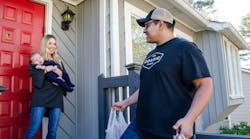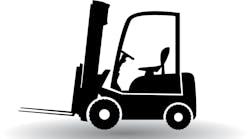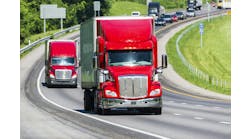Most good ideas come from a personal problem someone is trying to solve. That was exactly the case for Marc Gorlin, founder and CEO of Roadie.
He was remodeling a property and couldn’t get the part he needed for a number of days. Driving along the freeway where the part would have to travel it occurred to him that all of these cars traveling his direction had backseats and trunks that could easily carry his small part. Heck, he’d pay them to bring it to his house.
“And that’s when it hit me,” says Gorlin. “Why not find a way to get to that capacity.” Every day, 250 million passenger vehicles hit the road with 4 billion cubic feet of excess capacity, says Gorlin. “A crowdsourcing model could connect those drivers with people who need things delivered.”
So he created a company and an app to do just that.
And he has found success. Currently, the company has over 150,000 drivers. These drivers, which are screened and certified but not employed by Roadie, have delivered products to more than 11,000 cities and towns, covering 89% of all U.S. households. “We have the largest local same-day footprint in the nation — bigger than Amazon Prime Now,” says Gorlin.
A good example of his service and where it fills an existing hole is with Delta Airlines, a customer. “When something happens, like a huge snowstorm, and baggage is stuck at the airport airlines have a limited number of vans to take those bags back into the airport where they are stored and won’t get delivered to passengers for days,” says Gorlin. “But we use our drivers to descend on the area, pick up people’s bags and take it right to their homes, that same day.”
Retailers like Walmart and Home Depot and manufacturing companies like Nissan are all clients of Roadie. The company has even garnered support from UPS. While it seems like UPS would be a competitor, they don’t see it that way and have invested in the company through their Strategic Enterprise Fund.
The Greater Good
While branded the Uber of shipping, Gorlin sees a more profound reason for his company to exist. “As a society, we are moving away from human interaction using technology as our main source of communication. But with this model people are delivering goods to other people and interacting with them. My favorite story is of a man delivering a TV to an elderly woman. She asks him if he knows how to set it up and he proceeds to actually set it up for her in house.”
In addition to the TVs that are delivered and the occasional bird cages, it’s not all consumer goods that are being delivered, auto parts are a popular item as well.
The advantages of this model and the reason Roadie has grown and continues to grow, is its model is less restrictive than other logistics company, Gorlin says. Many companies have specific routes and mileage restrictions. Roadie doesn’t have this; they can cover any geographic area. They are also flexible with what they can carry to accommodate all sizes of packages. Furthermore, the flexibility can extend to accommodate unusual demand at a specific time with the ability to send out requests for multiple sources, as in the case of the airline example.
And sometimes this service can make a customer’s business model economically viable. In the case of Patrick, an emerging artist whose work is sold online across the country, the problem was that crating his oversized, heavy artwork to get it where it needs can cost up to $700 and that’s for an average piece that sells for $1,000. What happens is that customers happily buy the art, but then rescind the purchase because it would be too expensive to ship. But using Roadie’s model that can provide transportation to load his artwork into a driver’s vehicle, he is able to reach customers all over the country and now is able to sell beyond the local market.
And let’s not forget the environmental impact. Gorlin likes to point out that he’s not putting more vehicles on the road, causing more pollution, but instead using what is already out there. And there is the matter of avoiding packaging and its impact on the environment when the items are placed in the back seat or trunk.
Gorlin sees his company as solving problems all around. “We are bringing people closer together while helping the environment. It’s a good business to be in.”



